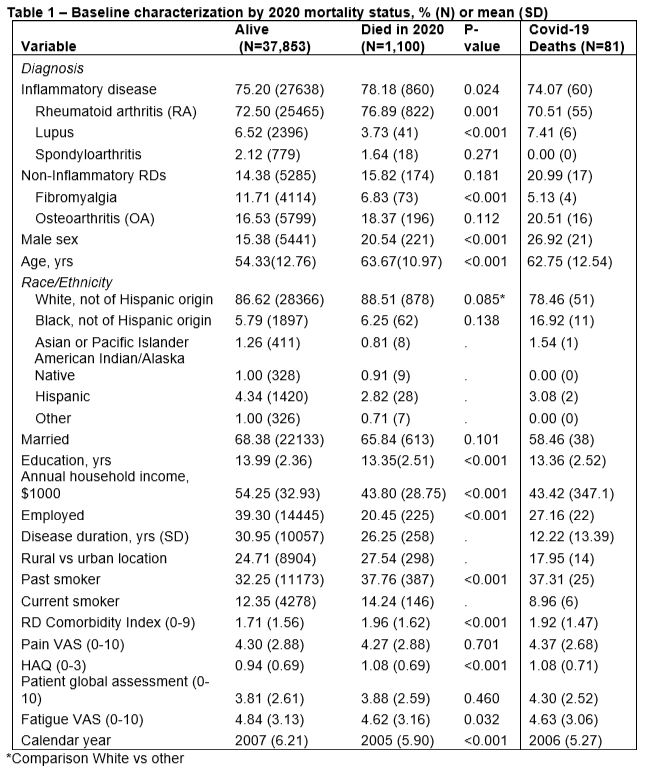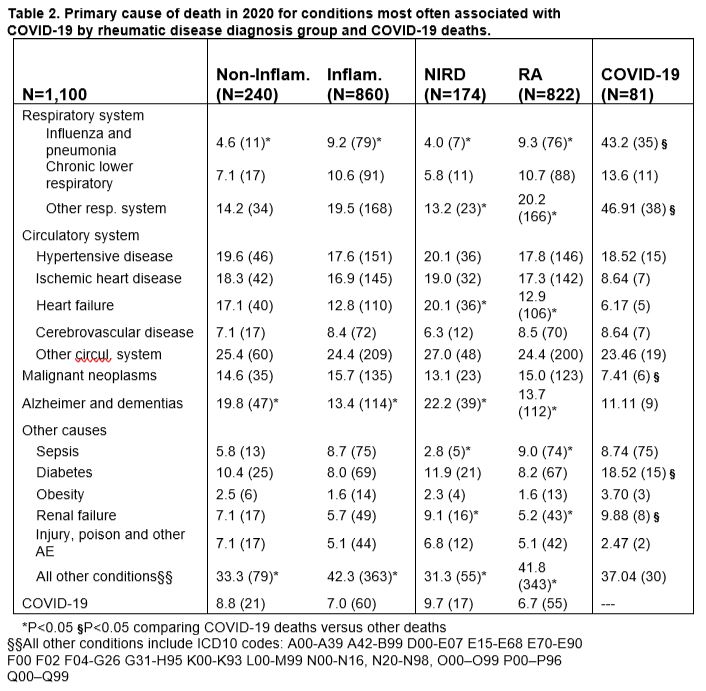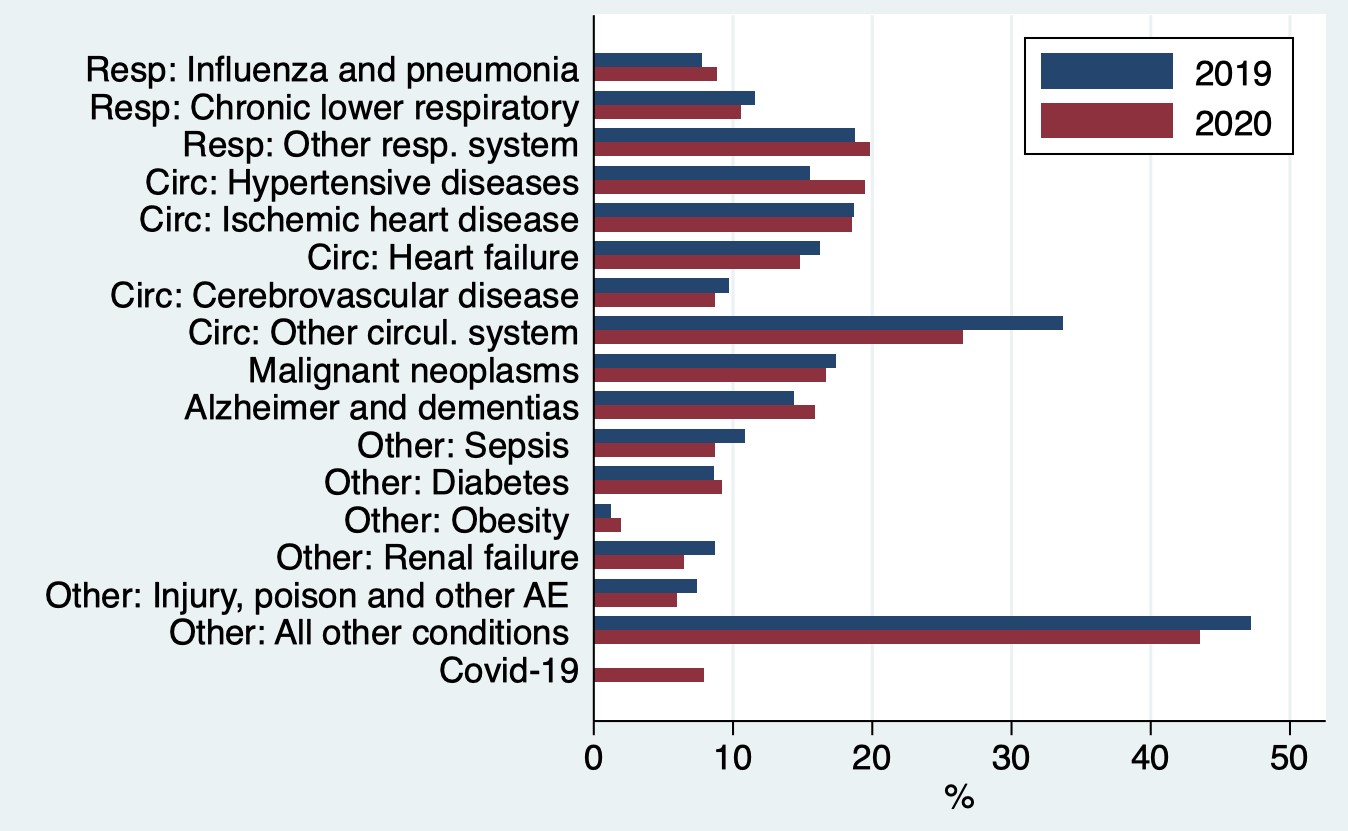Session Information
Date: Saturday, November 6, 2021
Title: Epidemiology & Public Health Poster I: COVID-19 & Vaccination (0084–0117)
Session Type: Poster Session A
Session Time: 8:30AM-10:30AM
Background/Purpose: Recent studies have detailed the excess death due to COVID-19 during the pandemic, yet few have examined these rates within a rheumatic disease population predisposed to COVID-19 and with extensive disease characterization. We sought to investigate the risk of mortality among patients with rheumatic diseases during 2020, and further examine aspects of those who died of COVID-19.
Methods: We studied non-deceased participants in FORWARD, The National Databank for Rheumatic Diseases, a longitudinal observational study following patients through biannual questionnaires as of January 1, 2020. Primary rheumatic disease diagnosis was confirmed through physicians and categorized as either inflammatory (Inflam) or non-inflammatory (Non-Inflam) and, in a large subset, RA vs Non-Inflammatory Rheumatic Disease (NIRD) that excludes primary fibromyalgia. Mortality was confirmed through US National Death Index-matched death records from 1/1999 through recently released 12/2020. Death records were classified by conditions that appeared concomitantly with COVID-19 to better identify possible misclassification of non-COVID-19 cases earlier in the pandemic (1). Patients were characterized at baseline or study enrollment in Forward. Cox regressions with baseline covariables were used to investigate the risk of mortality by diagnoses. Secondary analyses examined respiratory specific causes and those who died of COVID-19 during 2020. Finally, deaths that occurred in 2020 were compared to a similar cohort of deaths that occurred in 2019.
Results: Among 37,853 participants, 1100 died during 2020 (2.9%) and are characterized in Table 1. Those who died were older, more frequently had a diagnosis of RA, had worse socioeconomic status and disease measures, and completed fewer questionnaires. By cause of death, those with inflammatory disease or RA had increased respiratory-specific cause of death, while those with NIRD had increased deaths related to heart failure, dementia, and renal failure (Table 2). Deaths from COVID-19 were found in 81 patients, most frequently together with respiratory-specific and diabetes diagnoses. Predictors of mortality were studied among Inflam vs Non-Inflam and also RA vs NIRD. Adjusting for baseline confounders such as sex, age age2, disease severity, comorbidities, smoking and socioeconomic status, HRs were 1.31 (1.09 – 1.58) for Inflam vs Non-Inflam and 1.28 (1.02-1.60) for RA vs NIRD. For respiratory-specific deaths, the same HR were 1.72 (1.07 – 2.80) and 1.66 (0.92 – 3.00), respectively. There were 1074 deaths in 2019 and the causes of death were similar between 2019 and 2020 with the exceptions of COVID-19 and reduced other causes of death not associated with COVID-19 in 2020.
Conclusion: Using a large, multi-rheumatic disease registry and expedited NDI data, we found COVID-19 to be recorded in 8% of all 2020 deaths and was associated with respiratory failure, diabetes, renal failure, and disassociated with malignancies. After accounting for confounders, risks of respiratory death in 2020 were increased among inflammatory rheumatic diseases including RA. Follow-up analyses will formally quantify the excess mortality from COVID-19 in patients with rheumatic diseases.
To cite this abstract in AMA style:
Michaud K, Pedro S, Schumacher R, Kumar M, England B, Freifeld A. Mortality in 2020 Due to COVID-19 in U.S. Adults with Rheumatic Diseases: Data from a Large, National, Multi-Rheumatic Disease Registry [abstract]. Arthritis Rheumatol. 2021; 73 (suppl 9). https://acrabstracts.org/abstract/mortality-in-2020-due-to-covid-19-in-u-s-adults-with-rheumatic-diseases-data-from-a-large-national-multi-rheumatic-disease-registry/. Accessed .« Back to ACR Convergence 2021
ACR Meeting Abstracts - https://acrabstracts.org/abstract/mortality-in-2020-due-to-covid-19-in-u-s-adults-with-rheumatic-diseases-data-from-a-large-national-multi-rheumatic-disease-registry/



